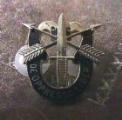I disagree with this assumption. The nature of war remains the same: the use of violence towards the realization of some desired political object. Strategy, which is dependent on time, place, resources, technology has certainly changed. I will also preempt the common assertion that the development of strategy over time is somehow progressive (that 'modern' strategy is inherently better and more effective than 'ancient' or 'classic' strategy). This too, I think, is false. The "principles" of warfare, therefore, should originate from and reflect the inviolable nature of war and not the various strategies which come to use from time to time.Since the nature of war has changed





 "A Sherman can give you a very nice... edge."- Oddball,
"A Sherman can give you a very nice... edge."- Oddball, 






Bookmarks